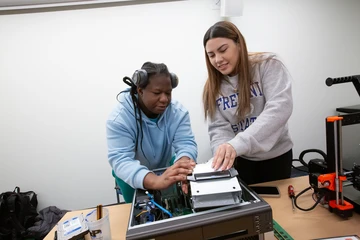Lead the Next Wave of Technology
Fredonia’s Computer Information Systems (CIS) program offers a strong foundation in both theory and practical applications, preparing you to lead in the ever-evolving world of technology. Whether you want to design, develop, or manage IT systems, our program equips you for high-paying careers in commercial computing and information management.
Fredonia’s CIS program is one of the most popular, offering what graduates need to thrive in tomorrow's technology landscape.
What You’ll Gain:
- IT Leadership Skills: Learn how to supervise technology projects and teams, preparing for roles as IT managers and project leaders.
- Real-World Applications: Gain hands-on experience in information systems design, development, and management for industries like finance, healthcare, and more.
- Career-Ready Expertise: Our program boasts a strong track record of placing graduates in high-paying jobs and prestigious graduate programs across the country.
- Cutting-Edge Knowledge: Stay ahead with innovative coursework, modern facilities, and instruction from dedicated faculty who are leaders in the field.











